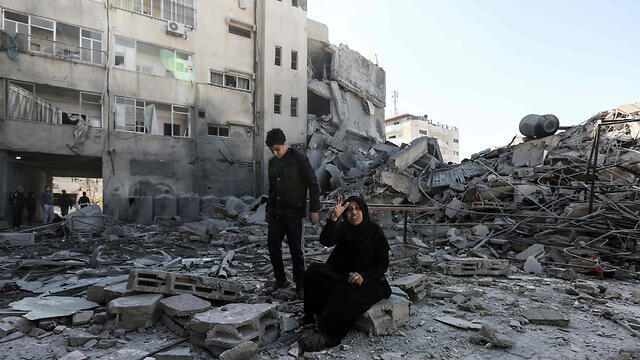Getting your Trinity Audio player ready...
It must have been inevitable. Monday’s pre-dawn rocket fire on central Israel occurred just hours before Hamas leader in Gaza, Yahya Sinwar, was to deliver a speech, marking a year since the start of the March of Return demonstrations. Although the campaign’s goals were always a little less grandiose than actually returning to pre-Israel Palestine, they were no less ambitious - trying to lift the blockade on Gaza.
and Twitter
A year has passed and Sinwar doesn’t really have anything to say, neither to the ordinary residents of the Strip nor to the loyal Hamas supporters who have demonstrated tirelessly week after week over the past year along the security fence. The economic situation has not improved and the millions in Qatari aid are just a drop in the ocean compared to the needs of Gaza’s residents, some of whom have stopped being afraid and taken to the streets .
The Egyptians - who have been indirectly mediating talks between Gaza and Jerusalem - presented Israel with a list of far-reaching demands from Sinwar, who thought that Netanyahu would try, at any cost, to avoid a military confrontation in Gaza two weeks before the Knesset elections. There is a sense of real distress within Hamas: neither Sinwar nor Ismail Haniyeh can afford to be left empty-handed and drag the masses into another year of useless demonstrations. At this point, it’s a matter of political survival for Hamas.
The Israeli response to these demands didn’t seem to satisfy Hamas, so Sinwar did what he always does and rolled the dice. Unlike previous rounds of cross-border fighting between Israel and Hamas, this time everything was somewhat low-key. The news of a direct hit by a rocket, which normally triggers outbursts of joy in Gaza, was met with a restrained response, accompanied by apprehension.
A year of security tensions didn’t go unnoticed on the other side as well. In the hours following the rocket fire, with reports of preparations for a wide-scale Israeli operation, the panic in Gaza reached its climax. Gazans stayed inside their homes, since bomb shelters are only available to Hamas officials, and left the doors a little open in order not get hurt from them flying off their hinges during the Israeli Air Force attacks.
The way things look at the moment, it seems as though this formula of limited understandings, restrain and transfer of Qatari cash to Hamas, has exhausted itself. Hamas wants an arrangement that would significantly improve the economic situation in Gaza and lift the blockade, while maintaining its military capability. And due to the growing public criticism about Hamas’s mismanagement of the Strip, the need for an arrangement has become more pressing.
Netanyahu, however, would not be able to give them that deal, even if he wanted to, and not only because of the elections. Palestinian President Mahmoud Abbas is determined to thwart any Israeli deal with Hamas. He has the ability to cut even more of the funds that he transfers to Gaza, which would result in even more instability.
There are those in Israel who believe that in order to come to any kind of arrangement with Hamas, a wide-scale military operation is needed (in order to curb the unrealistic expectations of Gaza’s leaders and bring them back to reality).
The only issue is that Hamas is trapped: They need a notable accomplishment to showboat to Gaza residents, otherwise their rule will be in danger. And in that case, they would prefer to risk defeat against Israel than against their own people.


